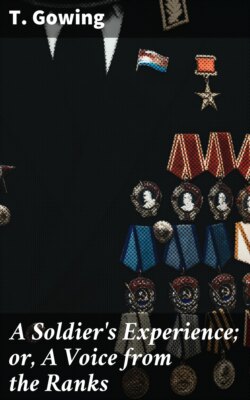Читать книгу A Soldier's Experience; or, A Voice from the Ranks - T. Gowing - Страница 6
На сайте Литреса книга снята с продажи.
CHAPTER I.
ОглавлениеTable of Contents
Boyhood—Enlistment—Will of Peter the Great—Recruits’ Drill—What the Fusiliers were 30 years ago—The Young Idea had to be taught how to Shoot—The Fusiliers depart for the East—The Writer quickly follows them—Voyage out—Call at Gibraltar and Malta—Landing in Turkey—Its Scenery and People—Marching and Counter-marching—The Unseen Enemy “Cholera”—Embark again for the Crimea, escorted by the Fleets of England and France—An Account of the Services of the Leader of the Crimean Army, Lord Raglan—also of Sir G. Brown, Sir De Lacy Evans, Sir Colin Campbell, Sir George Cathcart, and the Earl of Cardigan—Population of the British Empire—Remarkable Battles that have been fought on Sundays—Voyage up the Black Sea—The Russian Fleet.
I first saw the light of day in the quiet little town of Halesworth, in Suffolk, on the 5th of April, 1834; my parents were good Christian people, my father a Baptist minister. I remained with them in Halesworth until I was about five years old, when I removed with them to Norwich. I was brought up very comfortably; my boyish days being spent at school, and, like many more, I was for ever getting out of one scrape into another; evil companions led me into a number of things which when I came to my senses I knew well to be wrong, and I was fast breaking the hearts of those who wished me well; but, thank God, I was spared to bind up some of the wounds that I then caused. I had my own way to a dangerous length, through having a fond mother, who did all that lay in her power to hide my mis-doings—which is a fault that most boys will in after life forgive, and with gratitude remember. Thus, year after year rolled on. As a youth I admired much the appearance of a soldier, little thinking of all that lay behind the scenes. I had read Nelson’s exploits from boyhood, studied all his principal battles, and learned how he had forced our old enemies the French to tremble before him, till his glorious deeds made the whole Nation love and adore him, while his last thrilling words to his men will be remembered as long as our language endures—“England expects that every man will do his duty,”—a watchword that to this day inspires thousands in whose veins runs some of the best blood of Britain. I also read with eagerness Wellington’s brilliant career through life, how he first beat the Indians, ten and twelve to one, on various fields, and then rolled them up in a masterly style at the battles of Assaye and Argaum, returning home shortly afterwards to find more employment for his master-mind in Spain, Portugal, and France, and, eventually, striking down his spiteful enemy, Napoleon, on the ever-memorable field of Waterloo. The reader may, perhaps, from the foregoing form some idea as to the bent of my mind,—“Death before dishonour.”
In 1853 and the early part of 1854, as those of my readers who are old enough will remember, the Turks were trying to defend themselves against their ancient foes the Russians, and thrilling accounts were appearing in our newspapers about the different fights at the seat of war on the Danube. In March, 1854, the Western Powers, England and France, declared war against Russia, and at once rushed to the assistance of “the sick man,” soon putting a different aspect upon the face of affairs, and justifying the saying of that astute, though unscrupulous, general, Napoleon I.—England and France united could dictate to the whole world.
The fighting had been raging between the “Big Bully” (Russia) and the “Sick Man” (Turkey) for upwards of twelve long months; and, although the Turks then fought desperately for hearths and homes, numbers began to prevail, and in despair he called upon England and France to assist him. All was done that could be thought of to try and avert a general war; kind words were used both by England and France, but these did not avail. Russia was finally requested to withdraw her vast armies from Turkish soil. But, no! despotic Russia was blinded by fury. The hereditary policy of Peter the Great was being carried out; the prey was at her feet, and, rather than relinquish it, she would dare the two strongest nations on the face of the globe. The “holy will” of Peter the Great, I would here remind the reader, is always before the eyes of the Czars and Statesmen of Russia; and their over-mastering policy, let the consequences be what they may, is, therefore, animated by a spirit of aggrandisement. This will is worth reading, and I have taken the liberty of transcribing it, as it supplies the key to that crafty policy which the Muscovite power is for ever steadily pursuing.
WILL OF PETER THE GREAT.
